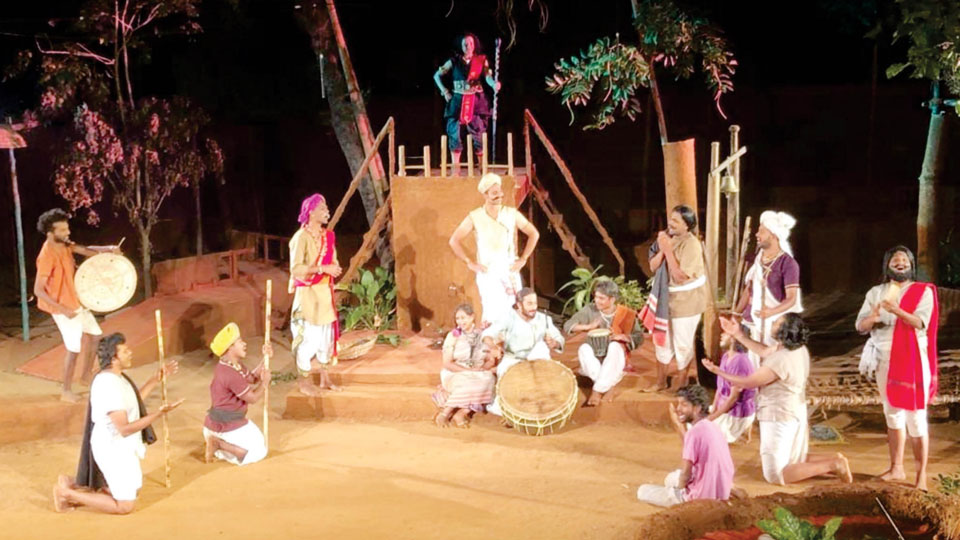Rangayana’s Bharateeya Rangashikshana Kendra, Mysuru, will be staging the play ‘Kakanakote’ at Vanaranga in Rangayana premises on Jan. 20, 27 and 28 at 6.30 pm
The only thing better than a good book is a play bringing it to life. Bharateeya Rangashikshana Kendra, Mysuru, staged the play Kakanakote on the second day of the Sankranthi festival series at Vanaranga, Rangayana, Mysore. The play was directed by S. Ramanatha of Kollegal. The play already popularised by the movie of 1977, is based on Masti Venkatesha Iyengar’s story.
Kakanakote is an interesting depiction of the plight of the tribal folk against the unjust imposition of tax on the Kuruba tribal communities living in Kakanakote. The plot tells the story of the Kaka Nayaka who was instrumental in stopping the exploitation of tribal people in Mysore district against the tax payment from middlemen who were representing the ruling kingdom government.
A place situated at a distance of 73 kms from Mysore, Kakanakote is well-known for its thick forest and large number of wild elephants. This forest range, which is now a wildlife national park monitored and regulated by the State government, was named after the legendary Kaka Nayaka, who was the leader of the local forest dwelling Kuruba people.
The play opened with a melodious song of the tribals. Hegdes were the Palegaras working for the Mysore kings and collected taxes from the innocent lot not only in the form of money but also in kind such as honey, ivory, chickens, liquor and other forest produces from the forest region. The Hegdes misused the order of the king and collected more from the poor tribes and later gave the king only the stipulated amount, pocketing the rest themselves. Kaka, who worked in the royal stables of Mysore growing up, knew the ways of the corrupt officials and decides to stop them.
On his return to his village, he proclaims himself the leader of local forest dwelling and refuses to pay taxes to Hegdes, saying they would pay the dues directly to the king. This prompts the Hegdes to use muscle power to bring the tribals down but the clever Kaka attacks Hegdes’ camp at night and kidnaps his only son and also the Karanika, who is an assistant of Hegde, so that with his only son in Kaka’s power, the Hegdes dare not attack Kaka. But the story develops into a twist where Kaka’s daughter falls in love with Hegde’s son and when Kaka discourages this, the young couple decide to take drastic steps.
In the meanwhile, Kaka gets a letter written by Karanika to His Majesty the Mysore Maharaja, explaining the situation of the village and requests him to grace the village with his presence. The kind and considerate king concedes to Kaka’s request and on his way, the king in disguise happens to meet the young couple who are running away from home. He promises to get them justice and brings them with him to the village.
While Kaka is overwhelmed with joy on seeing His Majesty, the deceptive character of Hegde in tax collection and of Karanika in writing a wrong letter to the king are revealed. Impressed by the bravery and wit of Kaka, the then Maharaja of Mysore names the forest after him and the place is known by the name Kakanakote henceforth. And the play ends with the wedding of the young couple.
The play closely followed the movie in dialogues, humour and action. The very popular songs of the movie ‘Nesara Nodu’ and ‘Kari Haidanembonu Madeshwara’ in addition to the other melodies were well received by the audience. Surprisingly all the actors were students of Gangubai Hangal Music and Performing Arts University, who did an excellent job. The stage layout for the play was by H.K. Dwarakanath, music by Anush Shetty and Munna, lights by Mahesh Kalhatti and dance direction by Shambhavi Swamy.
—Dr. Padmavathi Narasimhan








Recent Comments